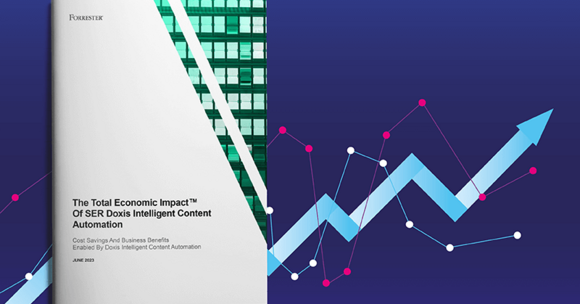SER Blog Customer Stories & Use Cases
Despite Brexit chaos, banks should modernize IT now
| Franziska Thomas
“Order!” When Speaker of the House of Commons John Bercow calls the lower house to order, he doesn’t mince his words. His reprimands have since become a social media hit. Bercow himself is obviously well organized. Just a couple of weeks ago, he brought to light a centuries-old document from the Parliamentary Archives. A document that said that an act of parliament, once rejected, may not be put to a vote again during the same parliamentary year. That had apparently slipped the minds of the parliamentarians.

The tumultuous scenes from Westminster depict more and more what the public has long suspected – the period after Great Britain’s withdrawal threatens to be just as chaotic as the Brexit process itself. Due to the announced EU withdrawal, the financial center of London particularly is in turmoil. Many banks and financial services have been preparing themselves posthaste for a ‘no deal’ Brexit. A study by the New Financial think tank on the impact of Brexit says that by March 2019 more than 275 financial firms had moved ₤800bn in assets out of Great Britain. It reports that some 5,000 employees are to be relocated or local hires recruited, mainly in Dublin, Luxembourg, Paris and Amsterdam. New industry focal points are emerging with asset managers primarily moving to Dublin and Luxembourg, and trading platforms concentrating in Amsterdam. Frankfurt is attracting almost all of the London-based banks. As a result of Brexit, the metropolis on the Main River is being tipped — at least in the European financial sector – as the designated successor to London.
Moving time – also for the IT system?
What’s the reason for the relocation plans, some of which are already quite advanced? Up to now, the banks have generally organized all their international business from London – with authorization to do so within the European Economic Area based on so-called passporting. This allows companies the freedom to provide cross-border services and set up subsidiaries, just like the free movement of European citizens. With the possibility of a ‘no deal’ exit, though, Great Britain would be treated as a third country by the European Union. If Britain-based companies wished to do business in the EU, they would then face a whole slew of new regulations, not least with regard to data traffic.
For many banks, the upcoming move from the Thames to the Taunus presents an opportunity to streamline their processes and make new strategic decisions. A move also often presents a prime time to critically look at the IT infrastructure. Because so much needs to be restructured anyway, companies will (want to!) transfer their data to a more efficient enterprise content management system – a challenging undertaking. “IT migration has to be well planned and smoothly implemented,” advises Stefan Girmann, Managing Director of SER Banking Software Solutions, based out of Frankfurt. “Banks are taking utmost care to ensure that customers are unaware of the data migration, at least as far as service is concerned. That is why IT has to function flawlessly at all times.”
Migration made easy – even for large banks
SER Banking Software Solutions has been specialized in document and business process management already since the early 1980s. It has been working very closely with financial institutions ever since, not only in the Brexit phase.
One such customer is Union Investment. As one of Germany’s largest investment companies with more than 3,100 employees, the corporate group has gained the trust of its customers – now numbering more than 4.4 million – over a period of more than 60 years. Assets under management amounting to €323bn (status as of 12/31/2018) require, along with the undivided attention and professionalism of staff, a reliable and performant IT base. The company chose to modernize its document management system to accommodate growing business demands. In fund management, a number of deliverables from various interfaces, such as orders or allowance applications, have to be processed within specific timeframes. A system needs to be robust, fail-safe and scalable, too, as volumes multiply with end-of-year business. And, operating costs should not go through the roof.
“Various business applications had to be migrated from diverse interfaces (such as the core banking system or SAP) to a unified platform, to be operated by a managed services partner, and with business running as usual. That posed quite a challenge,” comments Girmann, the SER project leader.
Union Investment today has an integrated solutions platform based on Doxis standard components that operates across all their locations and even cross-border. It also benefits from the vendor’s enhancements – another reason why the investment experts opted for SER in the selection process.
Disorderly Brexit, but orderly content
SER offers its customers the modular ECM suite Doxis that can provide them with a complete content infrastructure, if required – from inbound email to application processing and case handling, up to process optimization, compliance and audit-proof archiving. With the ongoing digitalization of the financial sector, such solutions will become increasingly important. The volume of documents in the banking business has been on the rise for years: applications for loans and allowances, fund and stock market settlements, risk analyses, credit ratings, legal assessments, real estate appraisals, plus all kinds of contracts needing to be safely kept and easily accessible – in London, Frankfurt or elsewhere.
“For all the understandable aggravation surrounding Brexit, relocating can also be a good thing – as long as you have efficient IT migration,” says Girmann. “The exit may be disorderly, but the content will be in order.”
The latest digitization trends, laws and guidelines, and helpful tips straight to your inbox: Subscribe to our newsletter.
How can we help you?
+49 (0) 30 498582-0Your message has reached us!
We appreciate your interest and will get back to you shortly.




